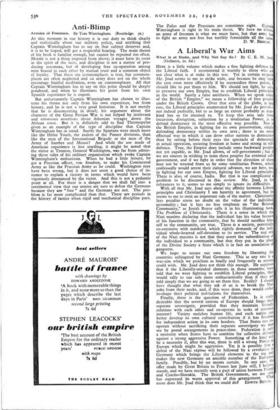A Liberal's War Aims
What is at Stake, and Why Not Say So? By C. E. M. Joa (Gollancz, 2s. 6d.) What is at Stake, and Why Not Say So? By C. E. M. Joa (Gollancz, 2s. 6d.) HERE is a little volume which makes a fine fighting defence fo the Liberal faith. I recommend it warmly to those who ar not clear what is at stake in this war. Yet in certain respect Mr. Joad seems to me to strike wide, and because he may stat the case even more effectively if he reconsiders these points, should like to put them to him. We should not fight, he says to preserve our own Empire, but to establish Liberal principle in the world. Surely a false antithesis. When we speak toda of the British "Empire," we mean a fellowship of free people under the British Crown. Over that area of the globe, at an rate, the Liberal principles enumerated by Mr. Joad do prevail not indeed perfectly, but to as large an extent probably as man kind has so far attained to. To keep this area safe fro incursion, disruption, subjection by a totalitarian Power, is defend democracy in the most effective way possible. Nor the British Empire, in fighting for its own preservation, simp defending democracy within its own area ; there is no mo: effectual way in which it can draw other nations to democra than by setting before their eyes the spectacle of democrac in actual operation, securing freedom at home and strong in self defence. True, the Empire does include some backward people not yet capable, as Mr. Joad allows, of self-government ; but we are sincere in wishing to train these peoples for eventual self government, and if we fight in order that the direction of the may not be wrested from us by some totalitarian Power, whic confessedly would arrest their cultural advance, we are here, too in fighting for our own Empire, fighting for Liberal principles There is also, of course, India. But that is too complicated problem to be discussed in this review. Mr. Joad, in hi references to it, seems to me simply to ignore its difficulties.
With all that Mr. Joad says about the affinity between Liber principles and Christianity I am heartily in agreement, but h seems to me to omit an important side of the matter. Christiani lays peculiar stress no doubt on the value of the individu personality ; but it lays no less emphasis on "the Belove Community," as Josiah Royce calls it in his illuminating book The Problem of Christianity. There is a sense in which th Nazi maxims declaring that the individual has his value becaus of his function in the community, that he should sacrifice him self to the community, are true. There is a society, potentiall!, co-extensive with mankind, which rightly demands of the indi- vidual whole-hearted self-devotion to its service. The real evil of the Nazi maxims is not that they assert the subordination o the individual to a community, but that they put in the place of the Divine Society a State which is in fact an association 0 gangsters. We hope to secure our own freedom by liberating the countries subjugated by Nazi Germany. This at any rate is a war-aim which we proclaim as loudly and frequently as anyone could wish. Mr. Joad does not think this enough. He supposes that if the Liberally-minded elements in those countries were told that we were fighting to establish Liberal principles, the would rally to our side more enthusiastically than if they are told simply that we are going to set them free. Really? I should have thought that what they ask of us is to break the Nazi yoke from their necks, and, if this were done, they would rather re-shape their political institutions for themselves. Finally, there is the question of Federation. Is it reallV desirable that the several nations of Europe should forgo thelr separate sovereignty, provided that they maintain friendly relations with each other and co-operate in tasks of common interest? Variety enriches human life, and each nation can better develop its own cultural contribution if it has freedom for independent action in its own borders. That States can co- operate without sacrificing their separate sovereignty we rnali see by postal arrangements in peace-time. Federation is onlY a necessity when States have to combine for collective defence against a strong aggressive Power. Something of the kind will be a necessity if, after this war, there is still a strong Power in Europe which might be aggressive. Yet it is possible that a defeat of the Nazi regime will be followed by a revolution in, Germany which brings the Liberal elements to the tor ‘1 makes the new Germany an amiable member of the European family. Possible, but by no means certain. In any case, the offer made by Great Britain to France last June still, I believe; stands, and we have recently seen a pact of union between Polan and Czecho-Slovakia. The British Government, we are zold,
That has expressed its warm approval of this arrangement.
more does Mr. Joad think that we could do? EDWYN SEWN


























































 Previous page
Previous page